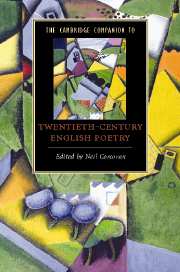8 - Keith Douglas and the poetry of the Second World War
from Part III - Modernists
Published online by Cambridge University Press: 28 January 2008
Summary
Two books Keith Douglas carried with him during the desert campaign, as recounted in his prose memoir Alamein to Zem Zem, were Alice in Wonderland and 'a short Survey of Surrealism'. Both are 'easily relatable', bearing an obvious relation to his experiences as Crusader tank commander in the Eighth Army. The men Douglas meets in his regiment and in the desert are odd in a manner clearly referencing both Robert Graves's Goodbye to All That and Waugh's satires, but indebted too to Alice's encounters with the strange beasts in her dream world. The brutal comedy of the war from Egypt to Tunisia is stylised according to the economy of Carroll's nonsense - this is a war replete with farce and nightmare jokes and booby traps, run by half-crazy, obsolete military, fought caged in fantastic machineries of death, rolling over an unreal landscape, fighting an enemy not hated but admired as reflections of the desert rats themselves. The comedy has Carrollian pathos too, sentimentality being generated by the very illogicality of this strange world:
it is exciting and amazing to see thousands of men, very few of whom have any idea why they are fighting, all enduring hardships, living in an unnatural, dangerous, but not wholly terrible world, having to kill and be killed, and yet at intervals moved by a feeling of comradeship with the men who kill them and whom they kill, because they are enduring and experiencing the same things. It is tremendously illogical - to read about it cannot convey the impression of having walked through the looking-glass which touches a man entering a battle.
(Alamein to Zem Zem, 16)- Type
- Chapter
- Information
- The Cambridge Companion to Twentieth-Century English Poetry , pp. 117 - 130Publisher: Cambridge University PressPrint publication year: 2007
- 1
- Cited by



